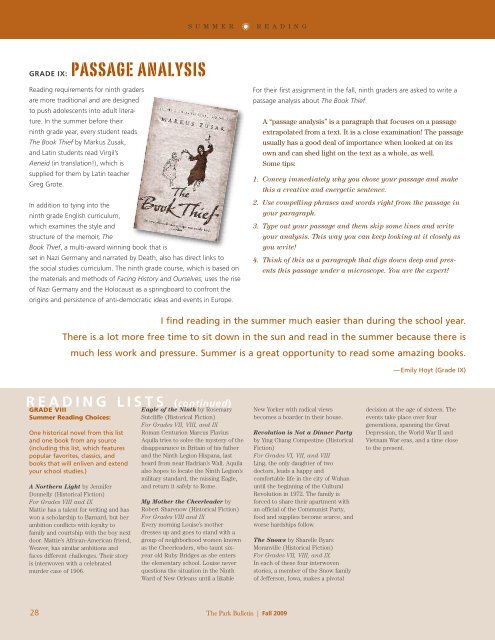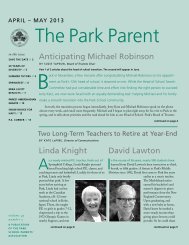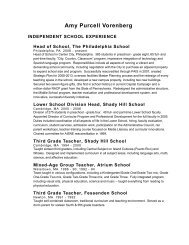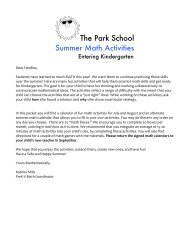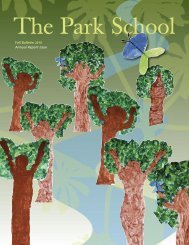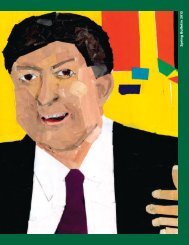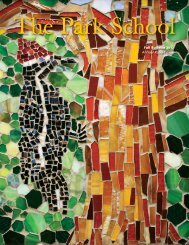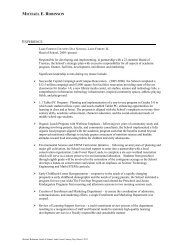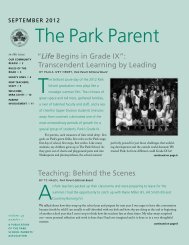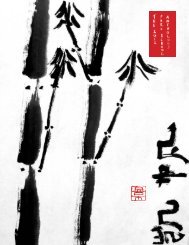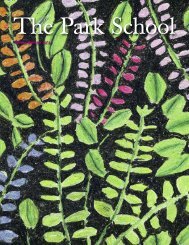⢠ParkBulletinCover - The Park School
⢠ParkBulletinCover - The Park School
⢠ParkBulletinCover - The Park School
You also want an ePaper? Increase the reach of your titles
YUMPU automatically turns print PDFs into web optimized ePapers that Google loves.
S U M M E R<br />
3<br />
R E A D I N G<br />
GRADE IX: PASSAGE ANALYSIS<br />
Reading requirements for ninth graders<br />
are more traditional and are designed<br />
to push adolescents into adult literature.<br />
In the summer before their<br />
ninth grade year, every student reads<br />
<strong>The</strong> Book Thief by Markus Zusak,<br />
and Latin students read Virgil’s<br />
Aeneid (in translation!), which is<br />
supplied for them by Latin teacher<br />
Greg Grote.<br />
In addition to tying into the<br />
ninth grade English curriculum,<br />
which examines the style and<br />
structure of the memoir, <strong>The</strong><br />
Book Thief, a multi-award winning book that is<br />
set in Nazi Germany and narrated by Death, also has direct links to<br />
the social studies curriculum. <strong>The</strong> ninth grade course, which is based on<br />
the materials and methods of Facing History and Ourselves, uses the rise<br />
of Nazi Germany and the Holocaust as a springboard to confront the<br />
origins and persistence of anti-democratic ideas and events in Europe.<br />
For their first assignment in the fall, ninth graders are asked to write a<br />
passage analysis about <strong>The</strong> Book Thief.<br />
A “passage analysis” is a paragraph that focuses on a passage<br />
extrapolated from a text. It is a close examination! <strong>The</strong> passage<br />
usually has a good deal of importance when looked at on its<br />
own and can shed light on the text as a whole, as well.<br />
Some tips:<br />
1. Convey immediately why you chose your passage and make<br />
this a creative and energetic sentence.<br />
2. Use compelling phrases and words right from the passage in<br />
your paragraph.<br />
3. Type out your passage and them skip some lines and write<br />
your analysis. This way you can keep looking at it closely as<br />
you write!<br />
4. Think of this as a paragraph that digs down deep and presents<br />
this passage under a microscope. You are the expert!<br />
I find reading in the summer much easier than during the school year.<br />
<strong>The</strong>re is a lot more free time to sit down in the sun and read in the summer because there is<br />
much less work and pressure. Summer is a great opportunity to read some amazing books.<br />
—Emily Hoyt (Grade IX)<br />
R E A D I N G L I S T S (continued)<br />
GRADE VIII<br />
Summer Reading Choices:<br />
One historical novel from this list<br />
and one book from any source<br />
(including this list, which features<br />
popular favorites, classics, and<br />
books that will enliven and extend<br />
your school studies.)<br />
A Northern Light by Jennifer<br />
Donnelly (Historical Fiction)<br />
For Grades VIII and IX<br />
Mattie has a talent for writing and has<br />
won a scholarship to Barnard, but her<br />
ambition conflicts with loyalty to<br />
family and courtship with the boy next<br />
door. Mattie’s African-American friend,<br />
Weaver, has similar ambitions and<br />
faces different challenges. <strong>The</strong>ir story<br />
is interwoven with a celebrated<br />
murder case of 1906.<br />
Eagle of the Ninth by Rosemary<br />
Sutcliffe (Historical Fiction)<br />
For Grades VII, VIII, and IX<br />
Roman Centurion Marcus Flavius<br />
Aquila tries to solve the mystery of the<br />
disappearance in Britain of his father<br />
and the Ninth Legion Hispana, last<br />
heard from near Hadrian’s Wall. Aquila<br />
also hopes to locate the Ninth Legion’s<br />
military standard, the missing Eagle,<br />
and return it safely to Rome.<br />
My Mother the Cheerleader by<br />
Robert Sharenow (Historical Fiction)<br />
For Grades VIII and IX<br />
Every morning Louise’s mother<br />
dresses up and goes to stand with a<br />
group of neighborhood women known<br />
as the Cheerleaders, who taunt sixyear<br />
old Ruby Bridges as she enters<br />
the elementary school. Louise never<br />
questions the situation in the Ninth<br />
Ward of New Orleans until a likable<br />
New Yorker with radical views<br />
becomes a boarder in their house.<br />
Revolution is Not a Dinner Party<br />
by Ying Chang Compestine (Historical<br />
Fiction)<br />
For Grades VI, VII, and VIII<br />
Ling, the only daughter of two<br />
doctors, leads a happy and<br />
comfortable life in the city of Wuhan<br />
until the beginning of the Cultural<br />
Revolution in 1972. <strong>The</strong> family is<br />
forced to share their apartment with<br />
an official of the Communist Party,<br />
food and supplies become scarce, and<br />
worse hardships follow.<br />
<strong>The</strong> Snows by Sharelle Byars<br />
Moranville (Historical Fiction)<br />
For Grades VII, VIII, and IX<br />
In each of these four interwoven<br />
stories, a member of the Snow family<br />
of Jefferson, Iowa, makes a pivotal<br />
decision at the age of sixteen. <strong>The</strong><br />
events take place over four<br />
generations, spanning the Great<br />
Depression, the World War II and<br />
Vietnam War eras, and a time close<br />
to the present.<br />
28 <strong>The</strong> <strong>Park</strong> Bulletin | Fall 2009


